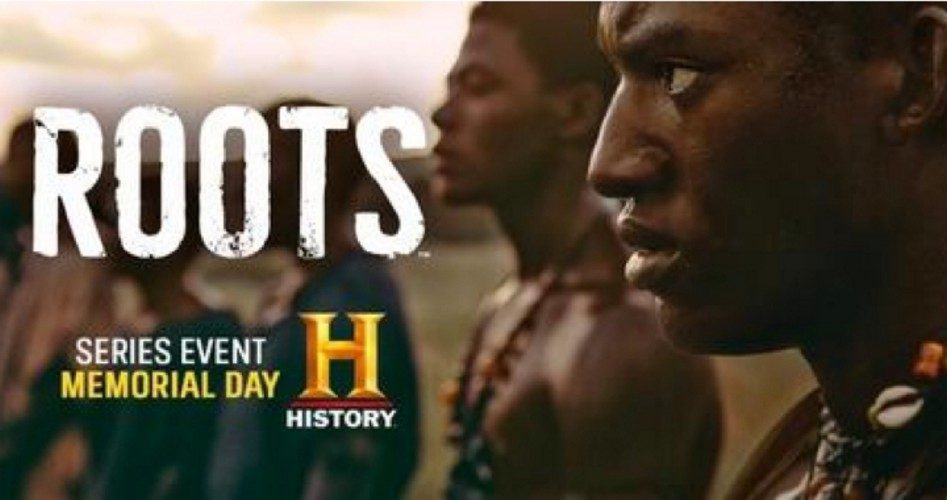
Critics would say it’s fitting: a misrepresented miniseries remake partially inspired by a Machiavellian movement. The latter is Black Lives Matter, which caught fire (aside from setting fires) despite police shootings of black suspects being down 75 percent over the last few decades and the fact that whites are more likely to be shot by police. The remake is Roots, an African slave story that lives on four decades after the original despite having been proven to be, as journalist Stanley Crouch put it, “one of the biggest con jobs in U.S. literary history.”
I was 11 when the original Roots aired in 1977, and it was quite the event. Based on a 1976 Alex Haley book by the same name, it’s still the most watched miniseries of all time; fully half of all U.S. homes — approximately 100 million people — viewed its final episode. As for cultural impact, the Hollywood Reporter tells us, “Hundreds of colleges planned courses on Roots, and more than two dozen U.S. cities held ‘Roots weeks,’ according to the Museum of Broadcast Communications.”
So given that even films such as Children of the Corn get remade, it’s not surprising that someone would want to remake a commercially successful miniseries. In Roots’ case there are many someones, with the four-part, eight-hour project debuting “on Memorial Day (May 30), airing simultaneously on History, Lifetime and A&E,” the Reporter informs. Notably, a co-executive producer is actor LeVar Burton, who played the starring role in the original as Kunta Kinte, a Mandinka warrior kidnapped from West Africa and sold into slavery in the United States.
Now, part of Roots’ appeal was that it’s supposedly the true story of author Alex Haley’s ancestors — it traced his “roots.”
But the real root of the story is a lie.
It’s not just “that large portions of what was sold as non-fiction cannot be verified,” as Breitbart’s John Nolte wrote in 2013. It’s that Haley was found guilty of plagiarizing 81 passages from the book The African, a fictional work by white author Harold Courlander. As Nolte related, calling Haley the “Lance Armstrong of Literature” and quoting another source:
In his Expert Witness Report submitted to federal court, Professor of English Michael Wood of Columbia University stated: “The evidence of copying from The African in both the novel and the television dramatization of Roots is clear and irrefutable. The copying is significant and extensive….
After a five-week trial in federal district court, Courlander and Haley settled the case with a financial settlement and a statement that “Alex Haley acknowledges and regrets that various materials from The African by Harold Courlander found their way into his book, Roots.”…
During the trial, Alex Haley had maintained that he had not read The African before writing Roots. Shortly after the trial, however, a minority studies teacher at Skidmore College, Joseph Bruchac, came forward and swore in an affidavit that he had discussed The African with Haley in 1970 or 1971 and had given his own personal copy of The African to Haley, events that took place a good number of years prior to the publication of Roots.
In fact, Haley’s courtroom lies were so numerous and outrageous that midway through the plagiarism trial, reports author Dr. Jack Cashill, presiding federal judge Robert Ward “counseled Haley and his attorneys that he would have to contemplate a perjury charge unless they settled with Courlander.”
Returning to Nolte, he summed up by quoting the earlier cited 2002 Crouch piece:
In the early 1980s, when Alex Haley, the author of “Roots,” was speaking at Lincoln Center, investigative reporter Philip Nobile asked him a straightforward question. Since he had paid Harold Courlander $650,000 [more than $2 million by today’s standards] in a plagiarism suit, why shouldn’t Haley be considered a criminal instead of a hero?
Haley had no answer. Well, what would you expect from someone who had pulled off one of the biggest con jobs in U.S. literary history?
And big it was. Note that Cashill tells us, “Nobile also revealed that Haley’s editor at Playboy magazine, the very white and Jewish Murray Fisher, did much of the book’s writing.” Thus, between plagiarizing The African and using a ghost-writer, one could wonder how much of “Haley’s” 1976 book Roots was actually written by him.
Nonetheless, laments Crouch, “the ‘Roots’ hoax has sustained itself. Every PBS station in America refused to show the 1997 BBC documentary inspired by Nobile’s reporting on the book. And tonight [1/18/02] NBC will air a retrospective on the 25th anniversary of the popular TV miniseries.”
So while LeVar Burton explained his desire to remake the series by saying, “There is a whole generation of Americans who don’t know the story,” the reality is that many generations don’t know Roots’ real story. For the fix was in from the beginning. The book’s publisher and the original series’ producer had no interest in revealing the truth, and Columbia University wasn’t going to rescind Haley’s Pulitzer Prize. Even more shockingly, however, Crouch reports that federal Judge Ward had actually asked Courlander to remain quiet about his huge settlement because Haley had become so “important” to black people.
For Haley’s part, he was not only unrepentant but in fact aggressively defended his lie. He told Nobile in 1979 that the reporter shouldn’t cover his case because it could be used by the “Ku Klux Klan.” He played the race card, according to Crouch, and accused those exposing his fraud of trying “to say that black people have no history.” He even, Nobile stated, “compared the truth about him to those people who attacked Anne Frank and said that there was no Holocaust. He would resort to anything.”
This includes lying about history and besmirching America in the process. And that’s the point: The deception that Roots is a true story gives it the weight of historicity. But it is fiction through and through. As Dr. Cashill also tells us:
Despite the book’s easy-going tone, Haley is quietly laying out an indictment against the United States that is always loaded and often gratuitous. In Haley’s tale, it is the whites who enter the forest and enslave the blacks, not Arab slave traders, not other blacks. Since Kinte is unconscious through the period of transaction, the reader has no picture of African participation in the slave market, nor of any Portuguese or Hispanic involvement in the slave trade.
As a Muslim, Kinte does not sense any virtue in Christianity. Indeed, it strikes him as crude and hypocritical. Coming of age during the revolutionary period in Virginia, Kinte sees the revolution as inherently fraudulent: “‘Give me liberty or give me death,’ Kunta liked that, but he couldn’t understand how somebody white could say it; white folks looked pretty free to him.”
Fraud is the means Haley uses to indulge his bias, and this he does in an extraordinarily reckless fashion.
And the Roots remake appears more reckless still. The Hollywood Reporter relates that it is even more violent than the original and has more racial epithets. It also has fewer white heroes, who, the magazine laments, “diverge seriously from Haley’s novel” — without ever pointing out that the novel itself diverged from reality.
Yet even if Roots were rooted in history, should such a thing be made at this juncture? There’s nothing wrong with learning about slavery in America, but there’s something very wrong with learning only about slavery in America. For inordinate focus on one aspect of history gives people a skewed grasp of history. As to this, does the average black teenager, or the average white teenager, appreciate that slavery is one of the world’s oldest institutions, once practiced virtually everywhere? Does he understand that it still exists in Africa today? And with the incessant focus on race now, is he told that while whites likely weren’t the first to embrace slavery, they were the first to eliminate it? This would lend perspective.
Instead, slavery is often portrayed today as a uniquely white-on-black crime against humanity, which can only sow hatred. The June 3 Hollywood Reporter cover boldly states, “Raw Wounds of Roots.” Raw, indeed. A wound can’t heal if you keep picking at it, but instead will likely become infected. And people have died from infections. Just as there were black-on-white “revenge” attacks after the Michael Brown incident in Ferguson (which also was fictionalized), it wouldn’t be surprising if Roots 2016 inspires the same.
As for cultural impact, the miniseries is off to a good start. Roots was screened at the Obama White House on May 17, just as President Woodrow Wilson screened Birth of a Nation at the White House a century before. It just seems as if progressive Democrats, no matter what the era, can’t let go of the racial fare and fomentation. And what does it matter if it’s friction-causing fiction? Never let a good lie go to waste.



